
American Heart Journal Plus: Cardiology Research and Practice
Scope & Guideline
Elevating Cardiovascular Research to New Heights
Introduction
Aims and Scopes
- Cardiovascular Disease Mechanisms and Treatment:
Research articles often explore the underlying mechanisms of cardiovascular diseases, including heart failure, arrhythmias, and coronary artery disease, alongside novel therapeutic approaches such as pharmacotherapy and interventional procedures. - Health Disparities and Social Determinants of Health:
A significant focus is placed on understanding and addressing health disparities, particularly within marginalized populations, emphasizing how social determinants influence cardiovascular outcomes. - Innovative Diagnostic and Therapeutic Technologies:
The journal highlights advancements in diagnostic technologies, such as imaging techniques and biomarker assessments, as well as new therapeutic modalities including catheter-based interventions and pharmacological treatments. - Cardio-Oncology and Cardiovascular Toxicity:
There is a growing emphasis on the intersection of cardiology and oncology, exploring the cardiovascular implications of cancer treatments and the management of patients with coexisting cardiovascular conditions. - Gender and Racial Disparities in Cardiovascular Health:
Research aims to elucidate the differences in cardiovascular health outcomes across genders and races, advocating for tailored prevention and treatment strategies.
Trending and Emerging
- Impact of COVID-19 on Cardiovascular Health:
Recent publications increasingly explore the cardiovascular implications of COVID-19, including its effects on patients with pre-existing conditions and the long-term outcomes post-infection. - Telemedicine and Remote Patient Monitoring:
With the rise of telehealth, there is growing research on the efficacy and outcomes of remote monitoring technologies for managing cardiovascular diseases, particularly in the context of the COVID-19 pandemic. - Interdisciplinary Approaches in Cardio-Oncology:
Emerging studies focus on the intersection of cardiology and oncology, highlighting how cancer treatments affect cardiovascular health and the importance of integrated care models. - Personalized Medicine and Pharmacogenomics:
There is an increasing emphasis on personalized treatment strategies based on genetic and phenotypic variations among patients, particularly in the context of pharmacotherapy for cardiovascular diseases. - Environmental and Lifestyle Factors in Cardiovascular Health:
Research is trending towards understanding the impact of environmental factors, such as pollution and lifestyle choices, on cardiovascular health, highlighting the role of public health initiatives.
Declining or Waning
- Traditional Risk Factor Studies:
There is a noticeable decrease in studies focusing solely on traditional cardiovascular risk factors (e.g., hypertension, hyperlipidemia) without incorporating newer insights into pathophysiological mechanisms or social determinants. - Basic Science Research:
The journal has seen a reduction in purely basic science studies that do not translate into clinical practices, as the emphasis shifts towards applied research with immediate clinical relevance. - Single-Center Studies:
There is a waning interest in single-center studies that do not contribute to broader, multi-institutional or population-based understanding of cardiovascular health, reflecting a trend towards larger cohort studies and multi-center trials. - Generalized Guidelines without Contextual Adaptation:
Research articles that merely reiterate existing clinical guidelines without contextual adaptation to specific populations or settings are becoming less common, as there is a push for more personalized medicine approaches.
Similar Journals
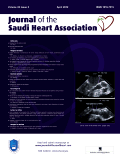
Journal of the Saudi Heart Association
Advancing Cardiovascular Knowledge for a Healthier TomorrowThe Journal of the Saudi Heart Association is a prominent scholarly publication dedicated to advancing knowledge in the fields of cardiology and cardiovascular medicine. Published by DIGITAL COMMONS BEPRESS, this open-access journal has been serving the global community since 2009, providing a vital platform for researchers, practitioners, and students interested in the latest developments in heart health and disease management. With an ISSN of 1016-7315 and a growing repository of knowledge alongside an E-ISSN of 2212-5043, the journal showcases an array of peer-reviewed articles that contribute to the understanding of cardiovascular conditions. Although categorized in the Q4 quartile for 2023, it remains committed to offering valuable insights, particularly within the constraints of the 29th percentile rank specified by Scopus. As the journal converges towards 2024, it continues to foster collaboration, innovation, and inquiry within the Saudi Arabian and international medical communities.
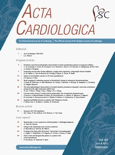
ACTA CARDIOLOGICA
Charting the future of heart health and medicine.ACTA CARDIOLOGICA is a distinguished journal published by TAYLOR & FRANCIS LTD, focusing on the dynamic fields of Cardiology and Cardiovascular Medicine. Established in 1946, the journal has maintained a significant presence in the academic community, providing a platform for cutting-edge research and clinical studies that aim to address challenges in cardiovascular health. With its Q3 rating in both Cardiology and General Medicine categories, it showcases a robust compilation of articles that reflect the evolving landscape of cardiac care. Although ACTA CARDIOLOGICA is not an Open Access journal, it continues to serve a vital role for researchers, professionals, and students dedicated to advancing knowledge in cardiovascular health. This journal, with an ISSN of 0001-5385 and E-ISSN of 1784-973X, is a critical resource for those looking to stay updated on the latest developments and practices in the specialization, contributing significantly to the field until 2024 and beyond.
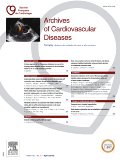
Archives of Cardiovascular Diseases
Elevating knowledge in cardiovascular diseases for better outcomes.The Archives of Cardiovascular Diseases, published by Elsevier Masson, stands as a leading journal in the field of cardiology and cardiovascular medicine, with an impressive impact factor that underscores its relevance and influence. This esteemed journal, recognized in the Q2 category for both cardiology and miscellaneous medicine, aims to disseminate groundbreaking research, innovative methodologies, and clinical advancements that can shape the future of cardiovascular health. With its diverse array of open access options, researchers and students alike have the ability to engage with high-quality content, ensuring that cutting-edge findings are accessible globally. Since its inception in 2008, the journal has actively contributed to the advancement of knowledge in cardiovascular diseases, fostering collaboration among clinicians, researchers, and educators. Headquartered in Paris, France, Archives of Cardiovascular Diseases remains committed to enhancing our understanding of cardiovascular health and improving patient outcomes worldwide.

Cardiology Journal
Unleashing insights for better heart health.Cardiology Journal, published by VIA MEDICA, stands as a prominent resource in the field of cardiology and cardiovascular medicine, with an ISSN of 1897-5593 and an E-ISSN of 1898-018X. Recognized for its Open Access model established since 1994, this journal facilitates widespread dissemination of critical research findings, allowing practitioners and researchers globally to access valuable insights without barriers. Based in Poland, with an address at UL SWIETOKRZYSKA 73, 80-180 GDANSK, it has achieved a respectable Q2 classification in 2023 for both Cardiology and Miscellaneous Medicine categories, reflecting its influence and quality within the scholarly community. With a Scopus ranking placing it at #117 out of 387 in Cardiology, it lies within the 69th percentile, underpinning its commitment to advancing knowledge in cardiovascular health. The journal’s converged years extending from 2006 to 2024 ensure it captures ongoing developments in a rapidly evolving field. As such, the Cardiology Journal serves as an indispensable platform for researchers, professionals, and students dedicated to exploring the frontiers of cardiac science and improving patient care.

CANADIAN JOURNAL OF CARDIOLOGY
Transforming Cardiology with High-Impact ResearchCanadian Journal of Cardiology (ISSN: 0828-282X, E-ISSN: 1916-7075), published by Elsevier Science Inc, serves as a vital platform for disseminating high-quality research in the dynamic field of cardiology and cardiovascular medicine. Since its inception in 1985, this journal has established itself as a leader in the field, currently holding a prestigious Q1 ranking in Cardiology, indicating its significant impact and contribution to medical science. With a Scopus rank of #50 out of 387 in its category and placing in the 87th percentile, the journal showcases rigorous peer-reviewed articles that advance knowledge and practice in cardiology. Although the journal is not open access, it provides valuable insights and research findings that cater to clinicians, researchers, and students who are committed to improving cardiovascular health. As we approach the convergence of years to 2024, the Canadian Journal of Cardiology continues to strive for excellence, facilitating a discourse vital for both academic and clinical advancements in cardiology.

Current Treatment Options in Cardiovascular Medicine
Elevating patient care through informed treatment strategies.Current Treatment Options in Cardiovascular Medicine is a leading journal dedicated to advancing knowledge in the field of cardiology and cardiovascular medicine. Published by SpringerNature, this journal seeks to bridge the gap between clinical practice and research by providing comprehensive reviews, insightful analyses, and updates on the latest treatment modalities available for cardiovascular diseases. With an ISSN of 1092-8464 and an E-ISSN of 1534-3189, it displays a commitment to disseminating critical information to healthcare professionals and researchers globally. Despite its recent categorization in the Q3 quartile, the journal continues to maintain relevance with a Scopus rank of #246 in the field, reflecting its contribution to the ongoing discourse in cardiovascular care. The publication encompasses a broad spectrum of topics, from interventional cardiology to pharmacotherapy, supporting the journal's objective to enhance patient care through evidence-based treatment options. Researchers, professionals, and students will find Current Treatment Options in Cardiovascular Medicine an indispensable resource for staying at the forefront of cardiovascular innovations and applications.
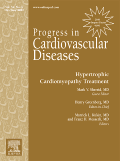
PROGRESS IN CARDIOVASCULAR DISEASES
Advancing the Frontiers of Cardiovascular MedicinePROGRESS IN CARDIOVASCULAR DISEASES is a leading journal in the field of cardiology and cardiovascular medicine, published by W B SAUNDERS CO-ELSEVIER INC. With an impressive impact factor that places it in the esteemed Q1 quartile of its category, this journal ranks among the top 32 out of 387 journals in its field, positioning itself in the 91st percentile. Since its inception in 1958 and continuing until 2024, it has been a prolific source of cutting-edge research, reviews, and clinical insights that contribute significantly to the understanding and treatment of cardiovascular diseases. Although it does not currently offer open access options, the journal's rigorous peer-review process ensures that all published content meets the highest standards of scientific excellence. As a key resource for researchers, practitioners, and students alike, PROGRESS IN CARDIOVASCULAR DISEASES serves as an indispensable tool for advancing knowledge and practice in cardiovascular health.
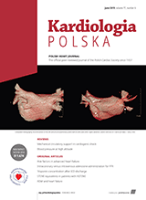
Kardiologia Polska
Bridging Knowledge and Practice in CardiologyKardiologia Polska, the esteemed journal of the Polish Cardiac Society, has established itself as a vital resource in the field of cardiology and cardiovascular medicine since its inception in 1954. With an ISSN of 0022-9032 and an E-ISSN of 1897-4279, this journal serves as a platform for groundbreaking research and scholarly articles that contribute to the advancement of heart health. Although currently not an open access journal, it remains an essential reference for practitioners and researchers seeking to stay abreast of the latest developments in cardiovascular science. The journal reflects its scholarly depth through a Category Quartile of Q3 and a commendable Scopus ranking at the 48th percentile in its field. Published primarily in Poland, it caters to a global audience eager to explore comprehensive studies spanning clinical cardiology, innovative therapeutic approaches, and emerging cardiovascular trends. Join a thriving academic community by engaging with the invaluable insights and research contributions found within the pages of Kardiologia Polska.
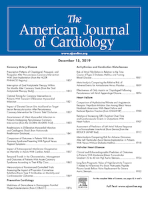
AMERICAN JOURNAL OF CARDIOLOGY
Exploring Breakthroughs in Cardiovascular Science Since 1958The American Journal of Cardiology is a leading peer-reviewed journal in the field of Cardiology and Cardiovascular Medicine, published by Excerpta Medica Inc-Elsevier Science Inc. Since its inception in 1958, the journal has consistently contributed to the advancement of cardiovascular research, providing a platform for groundbreaking studies and clinical findings that shape modern medical practices. With an impressive impact factor placing it in the Q1 category in its field for 2023, it ranks among the top journals in medicine, with a rank of #155 out of 387 in the Scopus database, reflecting its significance and rigorous editorial standards. The journal is committed to disseminating high-quality research that fosters innovation and enhances clinical outcomes in cardiology. Although it does not provide Open Access options, the American Journal of Cardiology remains an essential resource for researchers, healthcare professionals, and students looking to deepen their understanding of cardiovascular health.
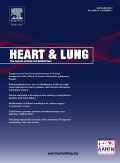
HEART & LUNG
Shaping the Future of Heart and Lung ResearchHEART & LUNG is a premier academic journal published by MOSBY-ELSEVIER, focusing on the critical intersections of cardiology, critical care, and respiratory medicine. Since its inception in 1973, the journal has established a significant reputation within the medical community, as evidenced by its impressive Q2 ranking in key categories such as Cardiology and Cardiovascular Medicine, Critical Care and Intensive Care Medicine, and Pulmonary and Respiratory Medicine for the year 2023. With a dedicated readership comprising researchers, healthcare professionals, and students, HEART & LUNG serves as a vital platform for disseminating cutting-edge research, clinical innovations, and comprehensive reviews that influence practice standards and enhance patient care. While it currently does not offer Open Access options, readers can access a wealth of information pivotal to the advancement of medical knowledge and practice through conventional subscription. Explore the latest findings and contribute to the ever-evolving landscape of cardiovascular and respiratory health through this esteemed journal.